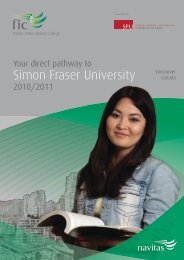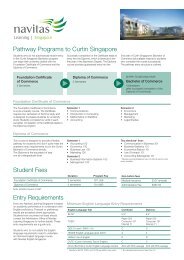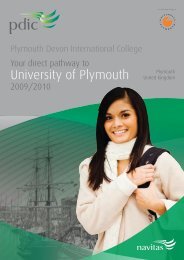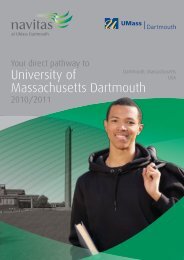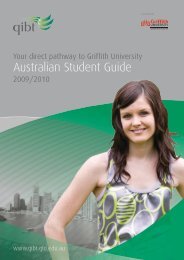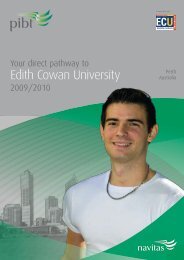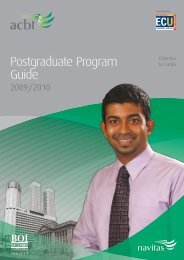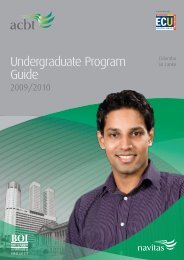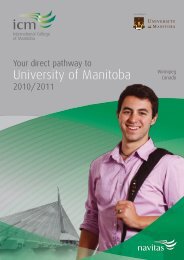Anglia Ruskin PG Prospectus - Navitas
Anglia Ruskin PG Prospectus - Navitas
Anglia Ruskin PG Prospectus - Navitas
You also want an ePaper? Increase the reach of your titles
YUMPU automatically turns print PDFs into web optimized ePapers that Google loves.
esearch opportunitiesresearch opportunitiesLanguages &InterculturalCommunicationDepartment of Languages &Intercultural Communication,Faculty of Arts, Law & Social SciencesThe Department of Languages and InterculturalCommunication has particular strengthsin empirical and theoretical approaches tocross-cultural and intercultural communication.These can be broadly categorised under twoheads: 1. Linguistic and cultural identities,2. Cultural and intercultural encounters in thecreative imagination. These research clusterscover related groups of activity and colleagueshave regularly worked together on jointpublishing or conference projects, final productsincluding an international conference on thenegotiation of neo-colonial identities held inFebruary 2007.The first category, linguistic and culturalidentities, has a focus on evolving identitieswithin rapidly changing communities and onthe reflection of these changes in linguisticand cultural patterns of behaviour. Within thiscontext, colleagues have investigated aspectsof linguistic practice in the European contextof growing mobility. Other research areas areurban multilingualism, language acquisitionand learning, language change and diaspora.Postgraduate supervision and support canalso be provided in language acquisition,language use, and questions of migration.Research in the second grouping, culturaland intercultural encounters in the creativeimagination, reflects a range of interdisciplinaryapproaches to predominantly European culturalproducts and contexts, frequently involvingcultural responses to the meetings of cultures.This includes the cultural history of Germanliterature and cinema with a particular focuson the behaviour of publicly acclaimed people,especially artists, in time of political crisis.Colleagues also investigate national identities,especially through landscape, gender, ritualsand traditions and their important implicationsfor an analysis of filmic images of identity.Other research is linked by the wider theme ofpost-colonialism within which colleagues haveexplored conflicting cultural discourses, identityconstructs, and intercultural communicationas reflected in contemporary French, German,Spanish, and Latin American literature and film.The Department of Languages and InterculturalCommunication has a strong postgraduateresearch culture, and is interested in recruitingstudents with a good upper-second class or firstclass Honours Degree. In addition, we welcomeapplications from candidates with equivalentqualifications and/or substantial professionalexperience. The Department supportspostgraduate research with a ResearchSupport Group and with the co-organisationof faculty-wide Research Seminars. Both groupscomplement the University-wide generic trainingwith a more informal context for postgraduatetraining and support.LawDepartment of Languages,Faculty of Arts,Law & Social SciencesLand law and management (especially relating toplanning and land titling in developing countriesand gypsy/traveller planning issues); Sports law(especially doping and international sports law);Criminal Justice and Criminology (especiallyyouth offending and management of courtservices); Human rights and public law.MusicDepartment of Music &Performing Arts, Faculty of Arts,Law & Social SciencesMusic has a strong research culture, situated inthe Department of Performing Arts and includestwo major areas of research: composition andmusic technology.A diverse choice of music research specialistareas is available and staff have expertise tosupervise work in many areas including thefollowing: 20th century music analysis;musicology and aesthetics; composition;music therapy; electro-acoustic music; operaand drama production; musical performance;human-machine interface; algorithmiccomposition; intertextuality in music; musictechnology applied to performance, film, video,and new media; and music technology andcultural identity. Students are invited to applyfor M.Phil and PhD in Music, which is situatedalongside strong subject areas of Music Therapyand Drama, making cross-disciplinary researcha possibility.Research students within the Department ofMusic and Performing Arts are supported bya well-developed system of supervisor andsupervisee training, and may take advantageof the range of expertise available from ourUniversity’s Research Office. The researchcommunity encourages close collaborationbetween staff and students across disciplines,through the sharing of ideas and the presentationof research findings in a variety of ways,including Faculty and DepartmentalResearch Seminars.Music TherapyDepartment of Music & PerformingArts, Faculty of Arts, Law & SocialSciencesMusic Therapy research is well establishedwith strong national and international links withclinical and academic research communities.Applications are welcomed from students forM.Phil or PhD study. Areas of staff expertisecover diverse research areas linking clinicaland innovative research practice, located inkey specialist areas, including: autism andassessment, adult mental health, dementia,children and families, links between method,technique and diagnosis in adult mental health,schizophrenia and personality disorders,arts therapies, learning disabilities, attachmenttheory, supervision in music therapy, the useof song and single line instruments in musictherapy and the relationship between musictherapy and psychoanalysis. The strong researchculture arises from an established professionaltraining and masters programme which islinked to a music therapy clinic on the Universitysite. Located in the Department of Music andPerforming Arts, which includes musicand drama, there are opportunities forcross-disciplinary research.Research students within the Department ofMusic and Performing Arts are supported bya well-developed system of supervisor andsupervisee training, and may take advantageof the range of expertise available from ourUniversity’s Research Office. The researchcommunity encourages close collaborationbetween staff and students across disciplines,through the sharing of ideas and the presentationof research findings in a variety of ways, includingFaculty and Departmental Research Seminars.92 Call our Contact Centre 0845 271 3333 for more informationweb www.anglia.ac.ukemail answers@anglia.ac.uk 93



